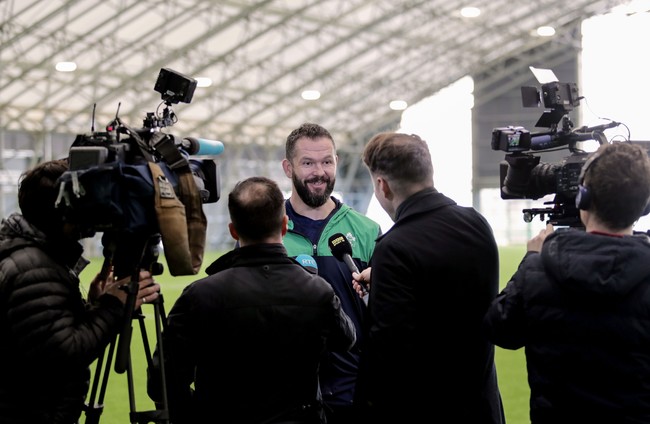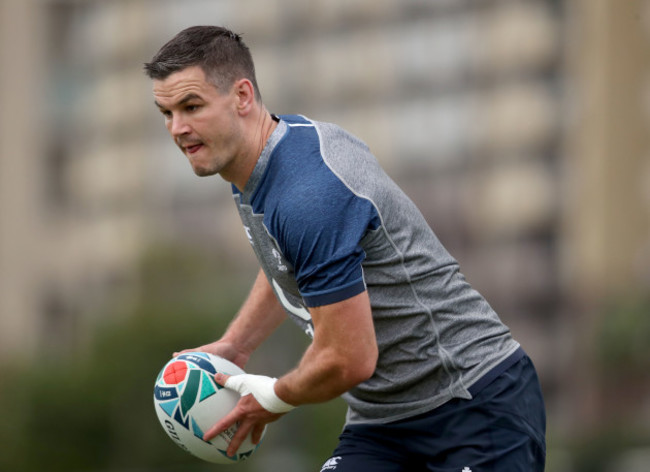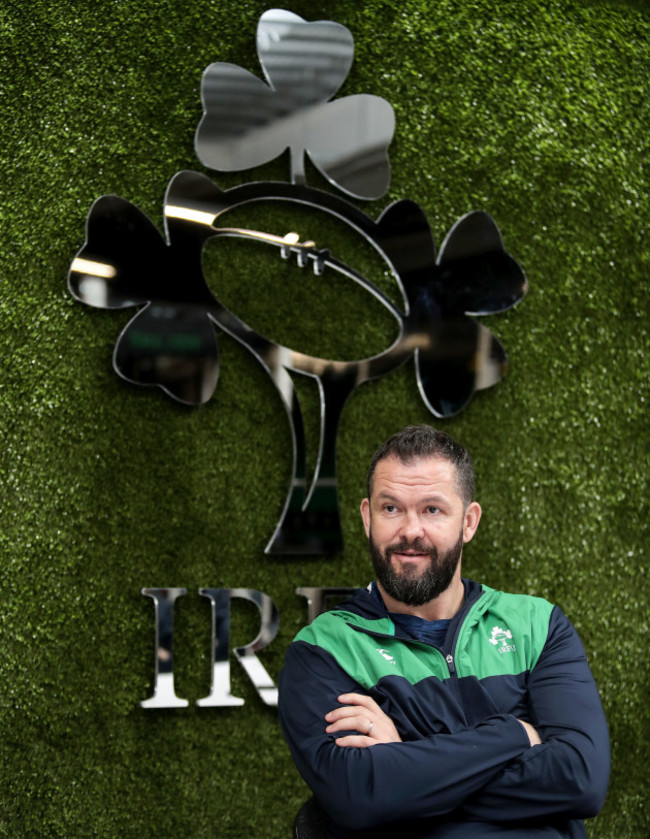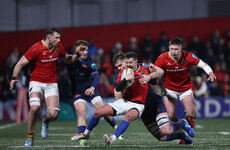A NEW DAY.
What better way to underline the fresh start for Ireland’s senior men’s team than for the new head coach to make his bow in the heart of the IRFU’s impressive new facility at the National Indoor Arena in Abbotstown.
“Whaddya think?” said Andy Farrell as he took the hot-seat in front of a shining emblem of the union, with doors to his left and right wide open and leading to the three-quarter-length indoor pitch that men and women’s Sevens teams have been honing their craft on throughout recent months.
After the pre-Christmas weekend mini-camp it will soon be the turn of the 15s before the new coach’s tenure begins in the white hot heat of the Six Nations Championship.
Traditionally, that is not a tournament where Ireland coaches can afford to indulge in experimentation or speculative punts. The bright and breezy new digs on the Sports Campus won’t signal immediate wholesale change come the new decade post-Schmidt, but Farrell has begun the process of marking out points of difference.
“I can be immersed in the detail, but hopefully I don’t get that immersed in the detail that it clouds me from what we want to stand for. The bigger picture stuff,” said the new head coach.
What that big picture looks like will hopefully be a little clearer after a run of games in charge. The former defence coach pointedly used the word ‘abrasive’ when describing how he wants his team to play and signalled an intent to improve the potency of Ireland’s attack.
“Progression, that will be the key. Winning would be another one,” said the Wigan man when asked what he wanted to see from the Six Nations.
But we’ve got to make sure we stand for something, and hopefully that will be clear and obvious to everyone, really, without trying to progress too early on most things and standing for nothing.
“We’ll evolve our attack along the way, and that will probably be a longer process, we’ll keep adding towards that.”
Farrell welcomed the input of new attack coach Mike Catt and his ability to fling an array of ideas into the mix, but the key to Ireland’s attack throughout Schmidt’s time coaching Leinster and Ireland was Jonathan Sexton.
The out-half is 34 and reluctant to put any limitation on how much longer he will play for. For Farrell, though, it’s important that the onus on the primary playmaker decreases.
“Not just because of his age profile, but because of how we want to evolve as a team.
“I’ve been speaking to Johnny about that over the last couple of weeks and he’s well on board with how we want to push forward.
“No team should be reliant on anyone. I don’t think that 100% is the case (that Ireland have over-relied on Sexton). Johnny’s been the star man over a few years. I suppose the key man for anyone in our squads going forward is: how are they going to get better as a player?
“Hopefully Johnny’s part of that as well.”
Sexton, of course, is among the leading candidates to take over as captain of this team after Rory Best’s retirement. The new head coach has not yet offered any hint as to who he will ask to lead this new era from 2020 and beyond.
He will be time enough unveiling that call when announcing his first team-sheet, an announcement which will be made on the Tuesday before each matchday. Another refreshingly forthright move from Farrell after he publicly announced his squad for ‘stocktake’ and explain his thinking.
He promises to keep an eye on form variations in the inter-pro and European weeks ahead and that the door will be ajar for men to play their way into the Six Nations squad from outside of the 45-strong group who gathered for camp on Sunday.
Where Farrell and Schmidt definitely share common ground is how they react to questions about style of play. He will step into the hot-seat hoping to arm his team with an array of approaches and not have them tied to any one.
“I think there are more ways than one to skin a cat or win a game, it’s broader than just style,” he said.
“There’s all sorts of reasons why you would try to have a Plan A, Plan B and a Plan C. One, because of the cattle that you’ve got, so what best fits them. The opposition that you’re playing, what plan fits into playing that type of opposition, obviously the conditions on the day but as the game’s evolving as we’re playing it in front of us, we’ve got to be good in the ‘what if’ scenarios, we’ve got to be able to adapt in many ways.
“We wanna be able to play physical and abrasive, we wanna be able to take it to the opposition physically, that’s what Irish teams have been very good at in the past and I’ve been on the end of that in 2007.
“But we’ve got skilful players, we’ve got smart rugby players, we’ve got players who have got a lot more in them to give and we wanna be able to adapt to the game in front of us.”
Farrell’s mention of skills brought to mind the outcomes of David Nucifora’s post-World Cup review, which cast a harsh light on the squad’s skill-set and also its mental strength.
Farrell is more than happy with the personnel at his disposal and their resilience.
“24 hours (in), the energy and enthusiasm, the willingness to learn and take on board a few new ideas et cetera has been great to see.
“I see a desperation in their eyes there when we’re speaking to them at the end of camp, that they want to be a part of this.
“So no, I wouldn’t say that’s going to be a problem going forward.”













If any player can deal with the pressure of being captain it’s this guy!
He is one dangerous looking man in that photo. I’m not sure if he should be made captain yet. Have a 6 nations run first maybe.
…..there will be a ‘changing of the guard’ needed in Irish rugby soon with some brilliant players who have served the cause well put out to pasture. Rightly it should be sooner rather than later. . Can see AF giving himself a couple of games, even a full 6N, to position his squad for the inevitable heave that has to come.At that point putting young Ryan in charge should be considered.
@Michael Murray: Hopefully we will all recognise the necessary rebuilding process for what it is and accept a fee bad results in the 6 Nations along the way.
I have my doubts. These pages can make for harsh criticism at times.
@Paul Ennis: ….agree and ill-informed criticism at that.